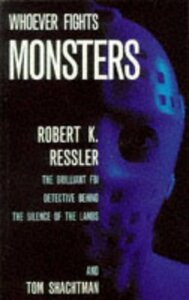Take a photo of a barcode or cover
adventurous
challenging
dark
emotional
informative
mysterious
reflective
sad
medium-paced
Graphic: Addiction, Animal cruelty, Body horror, Child abuse, Child death, Death, Drug abuse, Gun violence, Mental illness, Rape, Sexual assault, Sexual violence, Suicidal thoughts, Violence, Blood, Cannibalism, Stalking, Murder, Schizophrenia/Psychosis
De este libro me esperaba más de lo que en sí me he encontrado.
Está bien, sí, pero me esperaba otra organización de todos los tramos de lo que no cuenta.
Si os gustan las series como C.S.I y Mentes Criminales, debéis de darle una oportunidad a este libro. Nos cuenta qué hay detrás de los grandes asesinos en serie y qué les llevó a hacer eso, así como también el origen del Análisis de Conducta.
Y aquí es donde ha venido mi gran decepción con el libro: me esperaba que me contaran las características de los asesinos de otra forma. Yo esperaba que saliera x asesino con toda su historia en el mismo capítulo, pero no ha sido así. Hay que ir saltando entre capítulos y, cuando estaba metida de lleno en uno, me cambiaban a otro, dentro del mismo capítulo.
En sí, es bastante interesante para la gente que le gusten estos temas.
Está bien, sí, pero me esperaba otra organización de todos los tramos de lo que no cuenta.
Si os gustan las series como C.S.I y Mentes Criminales, debéis de darle una oportunidad a este libro. Nos cuenta qué hay detrás de los grandes asesinos en serie y qué les llevó a hacer eso, así como también el origen del Análisis de Conducta.
Y aquí es donde ha venido mi gran decepción con el libro: me esperaba que me contaran las características de los asesinos de otra forma. Yo esperaba que saliera x asesino con toda su historia en el mismo capítulo, pero no ha sido así. Hay que ir saltando entre capítulos y, cuando estaba metida de lleno en uno, me cambiaban a otro, dentro del mismo capítulo.
En sí, es bastante interesante para la gente que le gusten estos temas.
I read Whoever Fights Monsters years ago at my mother’s recommendation and after recently reading Mind Hunter and The Killer Across the Table by John Douglas and of course, watching the wildly entertaining and fascinating Netflix show, Mind Hunter (with the characters of Holden and Bill Tench loosely based on Douglas and Ressler), I decided to reread Whoever Fights Monsters and I’m glad I did.
Nietzsche’s quote at the beginning is so striking for this perfectly titled book – “Whoever fights monsters should see to it that in the process he does not become a monster.” What a warning that in crawling into the mind of a serial killer, one doesn’t want to truly think like or too deeply understand a serial killer.
This time around reading Whoever Fights Monsters, I was much more engaged and had more knowledge of the crimes, criminals, and the FBI’s Behavioral Science Unit. I find it interesting that Douglas and Ressler rarely refer to one another or give one another any type of credit. In addition, they both take credit for many of the same innovations, which cracks me up a bit. Clearly there’s a lot of professional jealousy between these two boys and it’s really hard to say who is telling the truth. Most readers tend to believe Ressler over Douglas because of Douglas’s huge ego, but as I’m rereading Whoever Fights Monsters, I have to say Ressler seems pretty darn proud of and speaks quite highly of himself as well. I really enjoyed this book the second time around, but I find Douglas a bit more interesting in his writing style.
I took one of Ressler’s points to heart and that is that with the explosion of programs about serial killers that are more like tabloid journalism, he is hearing from people who think it would be interesting to go to a cocktail party and chat with a Ted Bundy or other serial killer. He reminds us that these murderers are “awful examples of humanity and should not be idolized or emulated”. It reminded me of when I toured Alcatraz and saw Al Capone pillow cases in the gift shop. It was quite disturbing and a reminder to all of us of Nietzsche’s quote - “Whoever fights monsters should see to it that in the process he does not become a monster.”
Nietzsche’s quote at the beginning is so striking for this perfectly titled book – “Whoever fights monsters should see to it that in the process he does not become a monster.” What a warning that in crawling into the mind of a serial killer, one doesn’t want to truly think like or too deeply understand a serial killer.
This time around reading Whoever Fights Monsters, I was much more engaged and had more knowledge of the crimes, criminals, and the FBI’s Behavioral Science Unit. I find it interesting that Douglas and Ressler rarely refer to one another or give one another any type of credit. In addition, they both take credit for many of the same innovations, which cracks me up a bit. Clearly there’s a lot of professional jealousy between these two boys and it’s really hard to say who is telling the truth. Most readers tend to believe Ressler over Douglas because of Douglas’s huge ego, but as I’m rereading Whoever Fights Monsters, I have to say Ressler seems pretty darn proud of and speaks quite highly of himself as well. I really enjoyed this book the second time around, but I find Douglas a bit more interesting in his writing style.
I took one of Ressler’s points to heart and that is that with the explosion of programs about serial killers that are more like tabloid journalism, he is hearing from people who think it would be interesting to go to a cocktail party and chat with a Ted Bundy or other serial killer. He reminds us that these murderers are “awful examples of humanity and should not be idolized or emulated”. It reminded me of when I toured Alcatraz and saw Al Capone pillow cases in the gift shop. It was quite disturbing and a reminder to all of us of Nietzsche’s quote - “Whoever fights monsters should see to it that in the process he does not become a monster.”
As a fervent true crimer, this book was a very interesting view into the process of profiling (serial) killers and what aspects of a crime scene can lead to a profile to aid the police officers to arrest a killer. Although Ressler sometimes comes across as cocky and inserts certain stuff that adds absolutely nothing to the story he is telling, he is beyond doubt a man who knows what he is doing and I can only be glad to have gained yet another piece of very interesting knowledge.
I listened to this on audio. It was fascinating but NOT for the faint of heart! There is real evil out there. Also, it is SO important to be loved and cared for in childhood, the mother-child relationship being critical to growing up normal. Fathers being present is huge too. Turns out, a loving, intact family is a good thing for society!
rounding down from 2.5 bc of tone. [saw this recommended on Metafilter awhile ago; hope it's like Criminal Minds, only in book form.]
Ressler was the FBI profiler for which Mindhunters, the amazingly well done tv show, is based upon. The depth he went into writing about the fascinating murderers and serial killers whom he interviewed to learn more about the kind of a killer was so deep and kept me invested.
There were certainly parts that caused me to become uncomfortable, his empathy for Jeffrey Dahmer and the slightly sexist remarks for starters, but I found the entirety of the book to feed my murderino soul.
There were certainly parts that caused me to become uncomfortable, his empathy for Jeffrey Dahmer and the slightly sexist remarks for starters, but I found the entirety of the book to feed my murderino soul.
dark
informative
slow-paced
This book is somewhat dated now. But, there is still a lot of good information. Its Fascinating to explore how people can go so wrong.
dark
informative
reflective
tense
medium-paced
Graphic: Animal cruelty, Animal death, Child abuse, Child death, Death, Gore, Mental illness, Pedophilia, Rape, Sexual assault, Sexual content, Sexual violence, Torture, Violence, Blood, Kidnapping, Cannibalism, Murder




